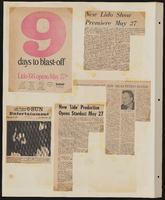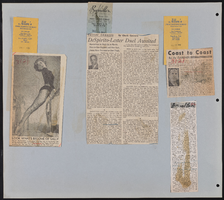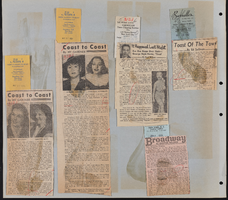Search the Special Collections and Archives Portal
Search Results
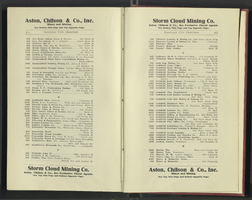
sod2021-076-161
Text
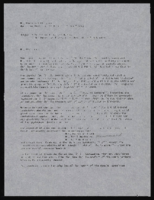
Appointment of Executive Director for the Economic Opportunity Board of Clark County: correspondence and documents
Date
Archival Collection
Description
From the Clark County Economic Opportunity Board Records -- Series I. Administrative. This folder contains correspondence and documents relating to the appointment of an Executive Director for the Economic Opportunity Board of Clark County during 1965 and 1966.
Text
Hamilton, Carolyn V.
Carolyn V. Hamilton is a former Las Vegas advertising executive and graphic designer. Born and raised in Seattle, Washington, Hamilton left her hometown in 1964 to be a Playboy Bunny in Detroit, Michigan. After obtaining a degree in commercial art, Hamilton worked in advertising in Los Angeles, California before relocating to Las Vegas, Nevada in 1973. Hamilton continued her career in Las Vegas at Jerry May Advertising, but when that firm dissolved in late 1973, she began working as a cocktail waitress at the newly-opened MGM Grand Hotel & Casino.
Person
Jeju Hyatt Regency Casino Records
Identifier
Abstract
The Jeju Hyatt Regency Casino Records date to 1985 and contain information about the Korean casino and its operation guidelines for various games, the conduct of their employees, and business reports for the casino. This information is provided in both English and Korean.
Archival Collection

Transcript of interview with Irene Doty by Jackie Ogden, March 20, 1977
Date
Archival Collection
Description
On March 20, 1977, Jackie Ogden interviewed Irene Doty (born 1914 in Dangerfield, Texas) about her life in Southern Nevada. Doty first talks about the first casino properties and restaurants in Las Vegas along with some of the other businesses and operations of the area. She also describes some of her experiences as a justice of the peace, conditions during World War II, and the clothing fashion of the time. Doty also talks about some of her experiences in Goodsprings, Nevada, and about her experiences as a juror and potential juror in several murder trials. The interview concludes with a discussion on housing development and gambling in Las Vegas.
Text
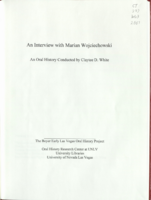
Transcript of interview with Marian Wojciechowski by Claytee White, June 16, 2009
Date
Archival Collection
Description
At age 95, Marian Wojciechowski recalls his personal story of being born a region called called Poland in 1914, just as World War I was beginning. This narrative gives special attention to his Polish background at a time when the country did not technically exist, and their language was forbidden. By the late 1930s and the dawning of World War II, Marian is a young man struggling to understand what is transpiring, but knowing that he must participate in the Polish underground resistance against the Germans His activism gets him arrested and sentenced to Auschwitz as a non-Jew and without penalty of death. He recalls the Gestapo beatings which have left him without feeling in his fingers and a loss of hearing. He shares historical perspectives of the war era, agricultural coops, goal of Germans to sell Jews to the United States and other countries, and a story about a woman who helped save 2500 Jewish children during war.
Text

Interview with Megan Gillespie Rice, June 22, 2005
Date
Archival Collection
Description
Text

